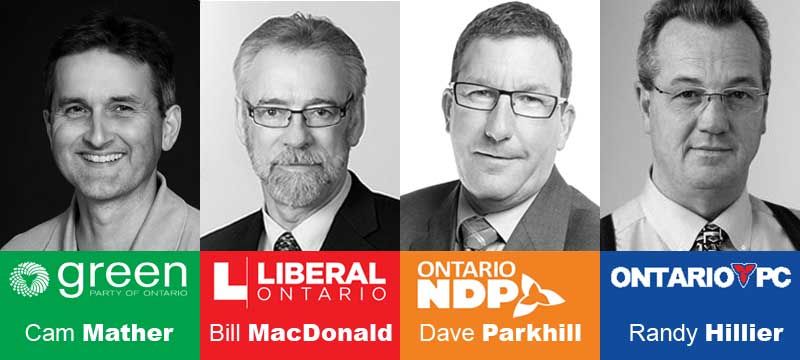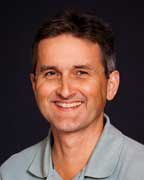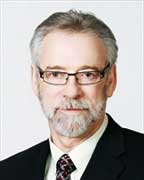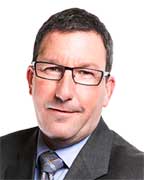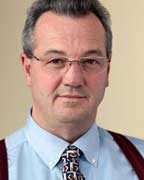Jeff Green | Jun 05, 2014
Earlier this week we conducted phone interviews with the four candidates who will be on the ballot on June 12.
The profiles in our election primer, which is on page 10, are based on those interviews and statements made by the candidates at two all-candidates’ meetings we organized, in Arden on May 26 and in Verona on June 2. The candidates were all gracious enough to attend both meetings and answered all the questions that were put them by the public.
While there were contentious issues raised at the meetings and the candidates sometimes responded angrily to what was being said, particularly when it reflected on their own character, the debate remained civil. As observers of this election will know, the parties are far apart on a number of issues and this was reflected in the debates and in the profiles.
Green Party – Cam Mather
Liberal Party - Bill MacDonald
New Democratic Party - Dave Parkhill
Progressive Conservative – Randy Hillier
Our next issue will come out on election day and thus will have no election-related content. We will post the riding results on Fronternacnews.ca as soon as they come in.
Green Party – Cam Mather
Cam Mather is the only first time candidate in Frontenac Lennox and Addington in this election.
Although new to electoral politics, he has been active politically as an advocate for energy conservation and local food production for a number of years.
He also comes by his Green Party affiliation honestly. He moved, with his wife Michelle, to an off-grid farm property near the border between Central Frontenac and Stone Mills. He has been active in the Tamworth-Erinsville area in developing a market for local food and has also published a number of books on small-scale farming, sustainable living and renewable energy through Aztext Press. He also lectures, conducts workshops and keeps up a blog about a variety of issues.
Among his books are “Little House off the Grid”, “Thriving During Challenging Times” and “The All You Can Eat Gardening Handbook”.
He is combining his campaign with some intensive garden work as he tends a patch that provides vegetables for 40 customers in Tamworth and Napanee who subscribe to his Community Supported Agriculture business.
So what would draw someone who has already found other political outlets into the rough and tumble world of provincial electoral politics in a riding where the Green Party only received 3.9% of the vote in 2011, down from a high of 7.2% four years earlier?
“It's true I have always been politically active and Michelle and I decided 15 years ago that we wanted to learn how to live a more or less typical North American lifestyle without hydro. But when I see that climate change is not something in the future, it is happening now, it was kind of a call to action,” he said.
Mather's main point, which he has been emphasizing at all opportunities, is that Ontario needs to institute a carbon pricing system.
“It works like this. A surcharge is put on all carbon-based energy that comes into the province, whether it be natural gas or oil, but not electricity any more because the province has now closed all its coal-fired electricity plants. That money will not stay with the government. It will go into a fund, and each quarter we will cut a cheque to each resident.
“We hope and expect people will use that money to improve the efficiency of their homes with new windows, insulation, and wood stoves. There are all sorts of things that can be done to cut energy use and energy costs. All of those activities can't be done from overseas, they will have to create local jobs to do the work that is needed and that is good for the local economy.”
He said that unlike all the other parties, the Greens are willing to talk about climate change, which he said is not an issue that anyone wants to deal with but will overshadow all the other issues that are being discussed during this election.
“None of those issues can compare with the implications of climate change,” he said. “We had a drought in the summer of 2012 that was more intense than any we have ever had. We had a polar vortex this winter; we never had a polar vortex. The change is here and if we don’t start addressing it right now all the talk about jobs and tax cuts and services and health care will come to nothing.”
He said that he would rather be home right now than out on the campaign trail, particularly in planting season, but, “None of us have that luxury right now. It is imperative that we speak the truth and put a price on carbon before it is too late.”
Liberal Party - Bill MacDonald
After the last provincial election in 2011, Bill MacDonald was spent. He had campaigned hard and expected a better result than a distant second place finish. At the time he said he would not be running again.
Well, things changed. Bill MacDonald was nominated once again by the Liberal Association in Lanark Frontenac Lennox and Addington and he has been campaigning in high gear since the writ was dropped for the election on June 12.
“The reason that I am running again is simple. It is because of the actions of our current representative over the last year and a half. This riding cannot afford another term like this.”
MacDonald points to the drought of the summer of 2012 when a program to transport hay to the region was set up.
“The Liberal riding association was contacted by the Lanark Federation of Agriculture to help secure some government support, and we managed to get $500,000 invested to help with the whole program. Through the entire process our local representative did not do anything, did not say anything about the program,” he said.
“His record on voting for things in our riding is terrible. He did not support a seniors’ tax credit, risk management for farms; he is against supply management programs. I'm not doing this for any gain for myself. I just feel so strongly, especially in this election, which I feel is the most important election we've had in 25 years, that because I am knowledgeable about how things work in government, I would be as good as any other representative from here.”
MacDonald does not think that the much talked about gas plant is of concern to voters in this riding.
“People are more concerned about the Conservative pledge to cut 100,000 jobs and all the spin off job losses that will come from that. All the parties would have cancelled that gas plant, and jobs are coming to this riding because the gas plant was moved,” he said.
He also thinks that while the Liberal party has made investments in the riding, such as new schools, and road and bridge work, having an MPP spending time promoting local projects would yield dividends.
“Frontenac County is the only county I know of that does not have a long term care facility in its borders. We own Fairmount Home but it is located in the City of Kingston and most of the beds are used by Kingston residents. There are homes in Lanark and Lennox and Addington to be sure, but none in Frontenac. And the last time Frontenac County had an MPP at Queen's Park was Jack Simmonet in the 1960s. I would work for the entire riding to be sure, but my question is about who has been working for Frontenac County in recent years.”
MacDonald has been involved in municipal politics for over 20 years, while running a forestry business in Frontenac County. He said that his experience in municipal politics under the Mike Harris government in the 1990s makes him fear that a Conservative government under Tim Hudak would result in lower levels of municipal service and higher costs.
“We lived with the downloading once. I spent my municipal career living with it while property taxes jumped and jumped. We don't want to go back to that again. I believe in building things up, in jobs and in the future, not in tearing things down,” he said.
New Democratic Party - Dave Parkhill
Dave Parkhill likes to say he knows the Lanark Frontenac Lennox and Addington (LFL&A) riding, particularly the Frontenac County end of it, from the inside out.
“I've started hearts in this riding, and I've delivered babies in this riding; I'm a paramedic,” he has been saying in his stump speeches during the campaign.
Although Parkhill lives in Kingston, as was pointed out by a questioner in one of the candidates' debates, he worked for a number of years out of the Parham ambulance base.
He said he has "travelled the roads to Vennachar, Holleford Road, 5th Depot Lake, everywhere in Frontenac and L&A. I've talked to people across the riding and I can see what they are dealing with, and there is a lot of poverty and a lot of needs that aren't being addressed by the Liberal government.”
In this campaign, his second in this riding, Dave Parkhill has been pointed in his critique of both the Liberal and Conservative parties. “The Liberals stole your money and the Conservatives are planning to gut all the services you rely on,” he said at this week's candidates' meeting in Verona.
He dismisses calls for strategic voting, particularly in LFL&A.
“In this riding, a vote against Randy Hillier is a strategic vote. It's the only way to send a message to the Conservatives that theirs is not the style of government that people want,” he said.
(Hillier received over 50% of the vote in the 2011 election)
At an all-candidates' meeting in Carleton Place, there was a smattering of boos for his message late in the meeting. He said afterwards the boos came from a number of formers members of the Lanark Landowners, the group that Randy Hillier headed before running for office. “'Boo, what are you talking about boo?' I told them, 'you drove tractors to Parliament Hill. What did that get you? Nothing. You sent Hillier to Toronto. What did that get you? Nothing.'”
He has been supportive of his party in response to questions about party leader Andrea Horwath's decision to trigger the current election by rejecting the left leaning budget of the ruling Liberal Party, saying that only the NDP understood the will of the voters who chose a minority government.
"The Conservatives said no to everything from the start and the Liberals want to rule as if they have a majority; only the NDP has shown any spirit of co-operation,” he said.
At the same time, not having a party platform in place at the beginning of the campaign was a frustration for him. “I feel it is easier now that the campaign has been released and I can say clearly what we will do if elected,” he said.
Although the platform is a bit more centrist than his own politics, that does not make Dave Parkhill any less of an NDP loyalist.
“The platform is a little softer on the corporate agenda than I would be, and I would also emphasize more about wanting to bring Hydro back into one house.”
He added that the long-standing party policies are the “bread and butter of the party, the air that we breathe,” while the platform is more of an immediate document with a time-specific message.
“The platform takes the policies and modifies them in a way that can best appeal to the public. I don't think I would have done it quite the way the party did it, but I'll own it. It is our platform,” he said.
Progressive Conservative – Randy Hillier
Randy Hillier says that when he started his career in electoral politics, seeking the Progressive Conservative nomination for the then newly constituted Lanark-Frontenac-Lennox and Addington riding in 2007, people warned him that electoral politics would change him.
At the time Hillier had recently resigned as president of the Ontario Landowners Association, which was known for tractor rallies in capital cities, deer culls, and political confrontations at farm and sawmill gates with federal and provincial bureaucrats.
“I said, ‘let's see who changes first, Queen's Park or me’. I think my record shows that I'm the same guy now that I was when I was first elected in 2007,” Hillier said.
He said that he sees the role of MPP as “fundamentally being the best advocate for my constituents, having an accessible ear and a compassion for the burdens and the unfairness that people face. Secondly, the role is to advance legislation and work on the administration of government, and lessen the need for an ombudsman. I have been very successful doing that for the last two terms and people are looking for me to continue.”
He said that one thing that he does not do is send out form letters to constituents.
“When someone needs assistance and all they receive from a ministry or a government department is a form letter, it doesn't help them. I do things much, much differently. When people have problems I make phone calls and I get them fixed.”
Two of the issues that he has worked on over the last year or so are advocating for recognition and proper treatment for Lyme disease and acting on constituent complaints about hydro billing, which led to a full scale report by the Ontario Ombudsman and the firing of some top level officials at Hydro One.
When asked at one of the all-candidates’ meetings if he supports the Conservative Party platform for this election, including the cutting of 100,000 public sector jobs, he said that he thinks the platform is a good one.
“Those jobs are not front-line service provider jobs; they are administrative and they will be done, for the most part, by a hiring freeze and attrition. The public service has grown by leaps and bounds in recent years, to 1.2 million”
He is also a supporter of the party position on corporate tax cuts, although he emphasizes another aspect of that policy. “The Liberal government engaged in $2.5 billion each year in corporate give-aways, subsidies to profitable corporations that are friendly with the Liberal party. The first thing we will do is end that practice.”
Although he did recognize, when pressed, that his party’s claim that they will create 1 million jobs if elected is more of a prediction than anything else, he said, “What we are trying to convey is that we have the capacity to create jobs if policies were in place that are conducive to job creation. We could have over a million more people working in eight years than are working now. The important thing is to reverse the trend of people leaving Ontario, as 150,000 have done, because of a lack of opportunity in a province that used to attract people.”
One of Randy Hillier's main political issues is the web of provincial regulations that he says are a major barrier to all sorts of small rural businesses, from farmers to loggers to tradespeople and beyond.
“There are thousands and thousands of regulations. They cost money to navigate through; they cost money to enforce; and many of them serve little or no purpose,” he said. “It is time someone went through them and decides which ones are important and useful, and which ones are not.”
More Stories
- Latest CUPW Job Action Stops Postal Delivery Of The Frontenac News Forcing Alternate Plans
- Opponents of Barbers Lake Gravel Pit Pack Ag Hall in McDonalds Corners
- Bobsleigh Olympian Jay Dearborn At Mikes Pizza In Sydenham
- The Loins Club Of and O'Lakes Roar
- North Frontenac Back Roads Studio Tour - September 27 and 28
- Sunday Market Vendors Give Back
- George Street Work As Town Hall Renovation Nears Completion
- One Way Street Plan Hits A Dead End - Central Frontenac Council, September 9
- Global Gardening
- No Winner Yet in Catch The Ace But Fundraising Target Met
